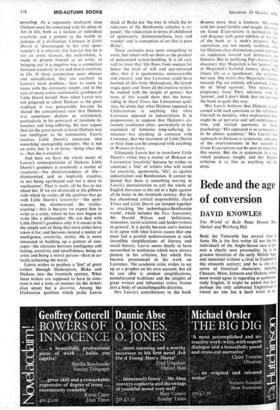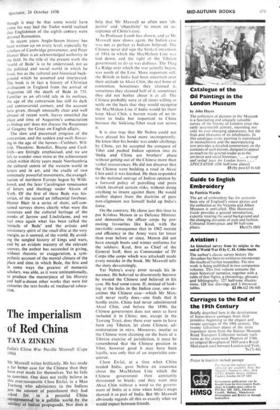Bede and the age
of conversion
DAVID KNOWLES
The World of Bede Peter Hunter Blair (Seeker and Warburg 80s) Bede the Venerable has several titles to fame. He is the first writer (if not the fire individual) of the Anglo-Saxon race to pre sent a clearly seen personality; he is the greatest historian of the early Middle Age and remained without a rival in England till the sixteenth century; and he is one of a series of historical characters, including Chaucer, More, Johnson and Dickens, whom most would agree in regarding as quintessen tially English. It might be added that he is perhaps the only celebrated Englishman 01 whom no one has a hard word to Sa
though it may be that some would have come his way had the Tudor world realised that Englishmen of the eighth century were devoted Romanists.
In recent years Anglo-Saxon history has been written up on every level, especially by scholars of Cambridge provenance, and Peter Hunter Blair is an acknowledged authority in the field. In the title of the present work the 'world of Bede' is to be understood, not as the political and • social world in which he lived, but as the cultural and historical back- ground which he assumed and interpreted. The book is in fact a history of Christian civilisation in England from the arrival of Augustine till the death of Bede in 735. Familiar as an oft-told tale in its outlines, the age of the conversion has still its dark and controversial corners, and the account here given, though unusually clear and well abreast of recent work, leaves unsettled the place and time of Augustine's consecration as bishop and does not discuss the Responses of Gregory the Great on English affairs.
The slow and piecemeal progress of the conversion, and the sudden and swift flower- ing in the age of the heroes—Cuthbert, Wil- frid, Theodore, Benedict, Biscop and Ceol- frith—are fittingly emphasised, and we are left to wonder once more at the achievement which within thirty years made Northumbria the cultural centre of the western world in letters and in art, and the cradle of two immensely powerful movements, the evangel- isation of northern Europe begun by Willi- brord, and the later Carolingian renaissance of letters and theology under Alcuin of York. Of the first of these Bede was his- torian, of the second an influential forebear. Hunter Blair in a series of short, self-con- tained surveys shows clearly what were the resources and the cultural heritage of the monks of Jarrow and Lindisfarne, and we feel once again what has been called the 'miracle of Bede' and the artistic and missionary spirit of the small elite at the very margin, as it seemed, of the world. By avoid- ing the tangled history of kings and wars, and by an evident mastery of the relevant sources, the author has succeeded in giving, without rhetoric or exaggeration, a sym- pethetic account of the mental climate of the place and dine in which Bede, the first and in some ways the greatest of monastic scholars, was able, as it were unintentionally, to produce the masterpiece of his History and half-a-dozen other works that were for centuries the text-books of mediaeval educa- tion.















































 Previous page
Previous page